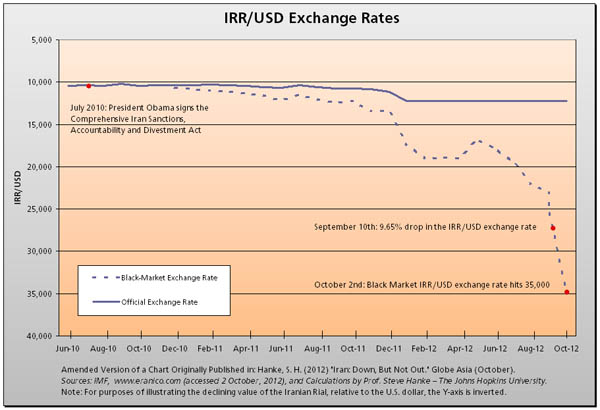Hyperinflation Has Arrived In Iran
Economics / HyperInflation Oct 04, 2012 - 03:08 PM GMTBy: Submissions
Steve H. Hanke writes: Since the U.S. and E.U. first enacted sanctions against Iran, in 2010, the value of the Iranian rial (IRR) has plummeted, imposing untold misery on the Iranian people. When a currency collapses, you can be certain that other economic metrics are moving in a negative direction, too. Indeed, using new data from Iran’s foreign-exchange black market, I estimate that Iran’s monthly inflation rate has reached 69.6%. With a monthly inflation rate this high (over 50%), Iran is undoubtedly experiencing hyperinflation.
When President Obama signed the Comprehensive Iran Sanctions, Accountability, and Divestment Act, in July 2010, the official Iranian rial-U.S. dollar exchange rate was very close to the black-market rate. But, as the accompanying chart shows, the official and black-market rates have increasingly diverged since July 2010. This decline began to accelerate last month, when Iranians witnessed a dramatic 9.65% drop in the value of the rial, over the course of a single weekend (8-10 September 2012). The free-fall has continued since then. On 2 October 2012, the black-market exchange rate reached 35,000 IRR/USD – a rate which reflects a 65% decline in the rial, relative to the U.S. dollar.

The rial’s death spiral is wiping out the currency’s purchasing power. In consequence, Iran is now experiencing a devastating increase in prices – hyperinflation. As Nicholas Krus and I document in our recent Cato Working Paper, World Hyperinflations, there have been 57 documented cases of hyperinflation in history, the most recent of which was North Korea’s 2009-11 hyperinflation. That said, North Korea’s hyperinflation did not come close to the magnitudes reached in the recent, second-highest hyperinflation in the world, that of Zimbabwe, in 2008, nor has Iran’s hyperinflation – at least not yet.
By Steve H. Hanke
www.cato.org/people/hanke.html
Steve H. Hanke is a Professor of Applied Economics and Co-Director of the Institute for Applied Economics, Global Health, and the Study of Business Enterprise at The Johns Hopkins University in Baltimore. Prof. Hanke is also a Senior Fellow at the Cato Institute in Washington, D.C.; a Distinguished Professor at the Universitas Pelita Harapan in Jakarta, Indonesia; a Senior Advisor at the Renmin University of China’s International Monetary Research Institute in Beijing; a Special Counselor to the Center for Financial Stability in New York; a member of the National Bank of Kuwait’s International Advisory Board (chaired by Sir John Major); a member of the Financial Advisory Council of the United Arab Emirates; and a contributing editor at Globe Asia Magazine.
Copyright © 2012 Steve H. Hanke - All Rights Reserved
Disclaimer: The above is a matter of opinion provided for general information purposes only and is not intended as investment advice. Information and analysis above are derived from sources and utilising methods believed to be reliable, but we cannot accept responsibility for any losses you may incur as a result of this analysis. Individuals should consult with their personal financial advisors.
© 2005-2022 http://www.MarketOracle.co.uk - The Market Oracle is a FREE Daily Financial Markets Analysis & Forecasting online publication.



